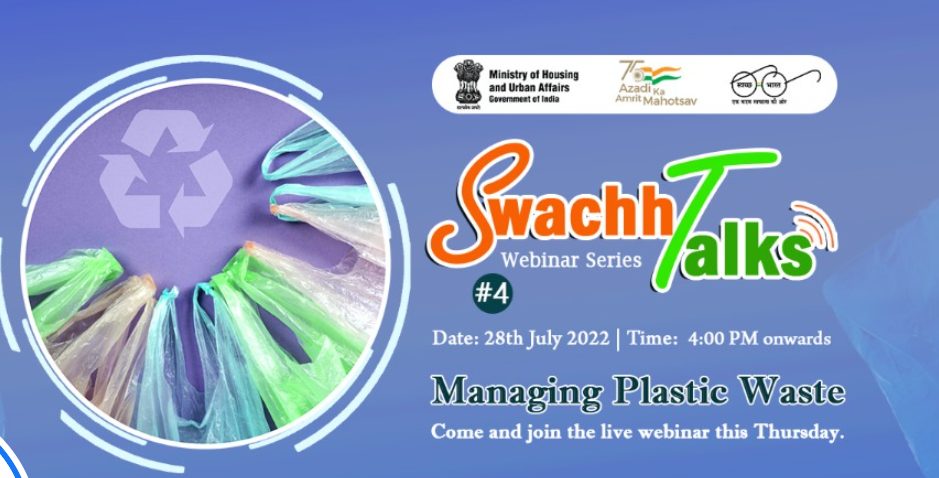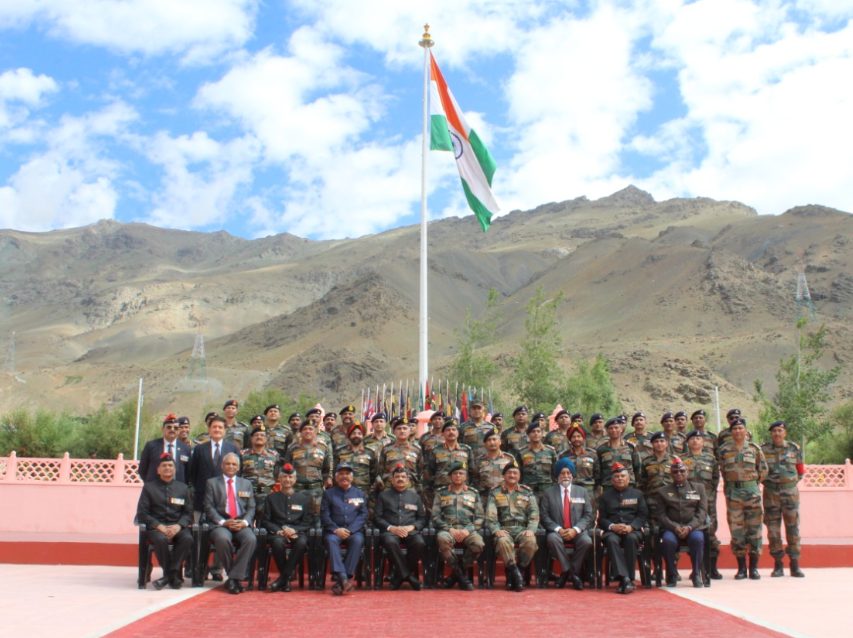
Swachh Bharat Mission-Urban 2.0, under the aegis of the Ministry of Housing and Urban Affairs, on 29th July, 2022 organized the fourth edition of SwachhTalks, the national peer learning webinar series on the topic of ‘Managing Plastic Waste’. The aim of this SwachhTalks episode was to nudge discussions around the need to effectively manage plastic waste to achieve the Mission’s goal of creating ‘Garbage Free Cities’.
While speaking to the nation through his ‘Mann Ki Baat’ series, Hon’ble Prime Minister Shri Narendra Modi has repeatedly emphasized on the need for citizens to come together to collectively combat plastic pollution and adopt Swachhata as a way of life.
The first announcement for phasing out single-use plastic was made on August 15, 2019 by the PM and was also reiterated during his ‘Mann Ki Baat’ address. PM Modi called for a national movement against Single Use Plastics as a tribute to Mahatma Gandhiji’s 150th birth anniversary. He said, “When we celebrate Mahatma Gandhi’s 150th anniversary we’ll not only be dedicating open defecation free India to him, but also kick-starting a mass movement for making India plastic-free… Let birth anniversary of Gandhi ji serve as an inspiration for all of us to curb single-use plastic.”
Since then, Indian cities and States have taken steps to enforce the Single Use Plastics ban from July 1, 2022. Nearly a month since the ban has been enforced, Swachh Bharat Mission-Urban 2.0’s SwachhTalks episode invited cities, States, organizations, and Swachhata Champions from across the country to take stock of the progress being made on managing plastic waste.
Ms. Roopa Mishra, Joint Secretary and National Mission Director, Swachh Bharat Mission Urban, Ministry of Housing and Urban Affairs highlighted India’s role as an emerging global leader in the field of sustainable sanitation and waste management and contextualized the progress being made across cities. She said, “India is crucially emerging as a strong voice in climate & environmental matters. The PM’s recently launched Lifestyle for Environment Movement (LiFE) is another landmark campaign that advocates for the same. The LiFE Movement is all about making the right choices and this is a guiding philosophy of the Mission as well. The ban on Single Use Plastics (SUP) is a landmark step in adopting eco-friendly lifestyles that are in harmony with nature. We are also witnessing unprecedented mass movements and jan andolan to create awareness regarding the same. This is just the beginning.”
Dr. Satyendra Kumar, Director, Ministry of Environment, Forests, and Climate Change talked about Plastic Waste Management Rules 2016, its respective amendments, and the revised Extended Producers Responsibility framework. He highlighted that the SUP items that have been banned in July 2022 are those that have ‘high littering potential and low utility’. The need of the hour, according to him, is to find sustainable, economic, and accessible alternatives to plastic.
Ms. Anindita Mitra, Commissioner, Municipal Corporation of Chandigarh spoke about the unique initiatives undertaken by Chandigarh Municipal Corporation to enforce the ban on Single-Use Plastics. Initiatives such as ‘Back to Basics’ to promote sustainable alternatives to SUPs, ‘Har Gaadi Bin-Har Gaadi Bag’ to prevent littering on roads and highways, and ‘Swachhata Ki Pathshala’ to mobilize youth to align with the goals of the Mission were taken by the Union Territory. On the other hand, the State Mission Directorate tackled the availability and distribution of SUPs by levying fines on shops, incentivizing market associations to become plastic-free, and by ensuring adequate availability of eco-friendly bags made of alternative materials. Other Extensive campaign and awareness activities such as ‘Selfie With Bottle’ to promote steel and glass bottles instead of plastic bottles, and public street plays have contributed to the successful implementation of the ban in Chandigarh.
Providing more perspectives on the ongoing jan andolan for Swachhata, Mr. Ripu Daman Bevli, also known as the Plog Man of India, spoke about the need to first ‘Refuse’ plastic items, before we ‘Reduce, Reuse or Recycle’ them. Speaking about linking Swachhata with swasthya, he said, “Bringing together the fitness with cleanliness has led to the creation and popularization of plogging as a way through which we can strengthen the jan andolan to achieve the Mission’s goal of Garbage Free Cities.”
While talking about initiatives being undertaken by Zomato India and Amazon India towards becoming ‘Plastic Neutral Businesses’, Ms. Anjalli Ravi Kumar, Chief Sustainability Officer, Zomato, and Ms. Shubhra Jain, Public Policy- Sustainability Lead, Amazon India spoke about various initiatives being undertaken by their companies. Highlighting the importance of segregating waste at source to achieve the goal of ‘Garbage Free Cities’, Ms Anjalli mentioned that Zomato is committed to create a ‘Waste Free World’. She said, “Plastic material is cheap & available, spill proof, food safe, keeps food hot, all of which are important in the Indian market. But how do we prevent plastics from reaching landfills? Segregation at source and recycling are a must while managing plastic waste. Last year, Zomato made cutlery optional for every online food order. This was an initiative taken before the SUP ban came into force.”
";

